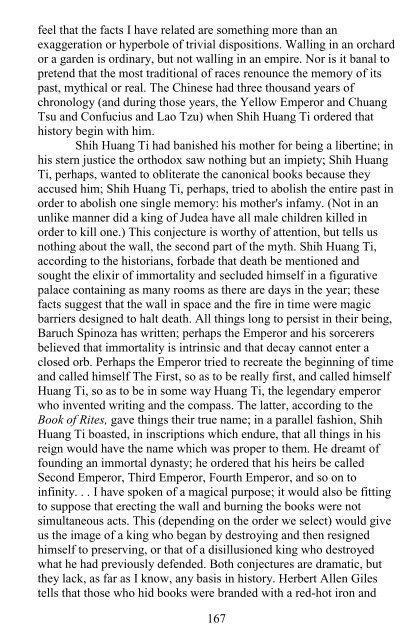Jorge Luis Borges - Labyrinths
Jorge Luis Borges - Labyrinths
Jorge Luis Borges - Labyrinths
You also want an ePaper? Increase the reach of your titles
YUMPU automatically turns print PDFs into web optimized ePapers that Google loves.
feel that the facts I have related are something more than an<br />
exaggeration or hyperbole of trivial dispositions. Walling in an orchard<br />
or a garden is ordinary, but not walling in an empire. Nor is it banal to<br />
pretend that the most traditional of races renounce the memory of its<br />
past, mythical or real. The Chinese had three thousand years of<br />
chronology (and during those years, the Yellow Emperor and Chuang<br />
Tsu and Confucius and Lao Tzu) when Shih Huang Ti ordered that<br />
history begin with him.<br />
Shih Huang Ti had banished his mother for being a libertine; in<br />
his stern justice the orthodox saw nothing but an impiety; Shih Huang<br />
Ti, perhaps, wanted to obliterate the canonical books because they<br />
accused him; Shih Huang Ti, perhaps, tried to abolish the entire past in<br />
order to abolish one single memory: his mother's infamy. (Not in an<br />
unlike manner did a king of Judea have all male children killed in<br />
order to kill one.) This conjecture is worthy of attention, but tells us<br />
nothing about the wall, the second part of the myth. Shih Huang Ti,<br />
according to the historians, forbade that death be mentioned and<br />
sought the elixir of immortality and secluded himself in a figurative<br />
palace containing as many rooms as there are days in the year; these<br />
facts suggest that the wall in space and the fire in time were magic<br />
barriers designed to halt death. All things long to persist in their being,<br />
Baruch Spinoza has written; perhaps the Emperor and his sorcerers<br />
believed that immortality is intrinsic and that decay cannot enter a<br />
closed orb. Perhaps the Emperor tried to recreate the beginning of time<br />
and called himself The First, so as to be really first, and called himself<br />
Huang Ti, so as to be in some way Huang Ti, the legendary emperor<br />
who invented writing and the compass. The latter, according to the<br />
Book of Rites, gave things their true name; in a parallel fashion, Shih<br />
Huang Ti boasted, in inscriptions which endure, that all things in his<br />
reign would have the name which was proper to them. He dreamt of<br />
founding an immortal dynasty; he ordered that his heirs be called<br />
Second Emperor, Third Emperor, Fourth Emperor, and so on to<br />
infinity. . . I have spoken of a magical purpose; it would also be fitting<br />
to suppose that erecting the wall and burning the books were not<br />
simultaneous acts. This (depending on the order we select) would give<br />
us the image of a king who began by destroying and then resigned<br />
himself to preserving, or that of a disillusioned king who destroyed<br />
what he had previously defended. Both conjectures are dramatic, but<br />
they lack, as far as I know, any basis in history. Herbert Allen Giles<br />
tells that those who hid books were branded with a red-hot iron and<br />
167


